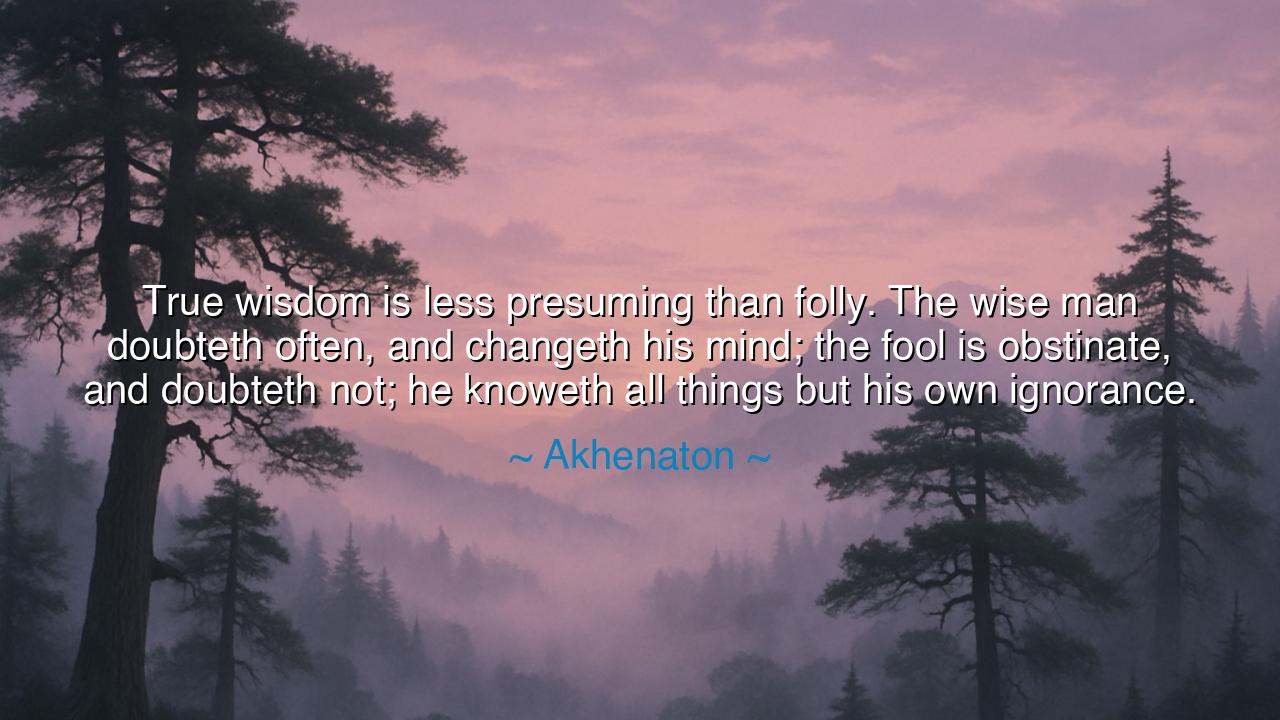
True wisdom is less presuming than folly. The wise man doubteth
True wisdom is less presuming than folly. The wise man doubteth often, and changeth his mind; the fool is obstinate, and doubteth not; he knoweth all things but his own ignorance.






Akhenaton, the heretic pharaoh who lifted his eyes to the sun of truth, declared: “True wisdom is less presuming than folly. The wise man doubteth often, and changeth his mind; the fool is obstinate, and doubteth not; he knoweth all things but his own ignorance.” In these words lies the eternal battle between humility and arrogance, between the seeker and the pretender. For true wisdom is never swollen with pride—it bends, it questions, it adapts. The fool, by contrast, stands rigid, blinded by the illusion of certainty, unable to see even his own ignorance.
The mark of the wise man is not that he claims all answers, but that he recognizes how much remains unknown. He doubts, not in despair, but in reverence for truth. His mind, like a river, changes course when new waters come, for he values truth above pride. But the fool is obstinate; he builds walls against new knowledge, fearing that doubt would reveal his emptiness. Thus Akhenaton teaches us that doubt is not weakness, but strength—the very gateway to understanding.
History confirms this lesson. When Galileo looked through his glass at the heavens, he doubted the wisdom of the ages that said the earth stood still. He changed his mind and spoke of a new order of the stars. The fools of his time, obstinate in tradition, silenced him, clinging to their false certainty. Yet history vindicated the doubter, proving that wisdom walks with humility, while folly dies of its own stubbornness.
So too in the life of nations. The leaders who dare to admit error, who shift their course when justice demands it, are remembered as wise. Those who cling to error out of pride, condemning millions to needless suffering, are remembered as fools. The obstinate fool may shout loudly in his day, but the wise doubter endures across centuries, honored for his courage to change.
O children of tomorrow, engrave Akhenaton’s counsel upon your hearts: be not ashamed to doubt, nor afraid to change. For in doubt lives humility, and in humility lives true wisdom. Fear instead the blindness of arrogance, the prison of obstinacy, the poison of false certainty. The wise man knows his limits and thus grows; the fool denies his ignorance and thus perishes. Remember always: to question is divine, to change is noble, and to walk humbly is to walk in the light of wisdom.






TNNguyen Hoang Tuyet Nhi
Reading this raises questions about leadership and decision-making. If the wise are defined by their openness to change and self-reflection, should we prioritize these qualities when selecting leaders? Could societies benefit from systems that reward flexibility and adaptability rather than stubbornness? At the same time, how do we prevent constant doubt from undermining authority or confidence in collective action? It seems like a delicate but crucial balance.
DHPham duy hoang
This makes me think about the personal struggle between confidence and doubt. How do we know when to trust our instincts versus when to reconsider them? The quote implies that rigidity is the hallmark of folly, but constant doubt can also be paralyzing. I’d like insight into how the wise navigate this tension effectively, ensuring that doubt leads to growth rather than indecision or anxiety.
HVHa Viet
I feel intrigued by the moral undertones of this quote. It frames wisdom not just as knowledge, but as the awareness of our own ignorance. Does this mean that education and experience are valuable only when paired with self-reflection? How can we teach this balance in schools and workplaces so that people learn both critical thinking and the humility to change their minds when new evidence emerges?
TAThuy Ann
This perspective feels both enlightening and challenging. It implies that wisdom is dynamic, involving ongoing reflection and adaptation. I wonder, though, in fast-paced environments like business or politics, is there room for this kind of thoughtful doubt, or does the pressure to appear decisive override humility? How might we balance the need for action with the recognition that our understanding is always partial and evolving?
LPThao Le Phuong
Reading this prompts me to consider the difference between intellectual arrogance and genuine knowledge. It’s striking how the fool believes they know everything while the wise remain aware of their limitations. How can we encourage a culture where questioning and reconsidering one’s views is seen as strength rather than weakness? Could this perspective help reduce conflicts caused by stubbornness and encourage more collaborative problem-solving in both personal and societal contexts?